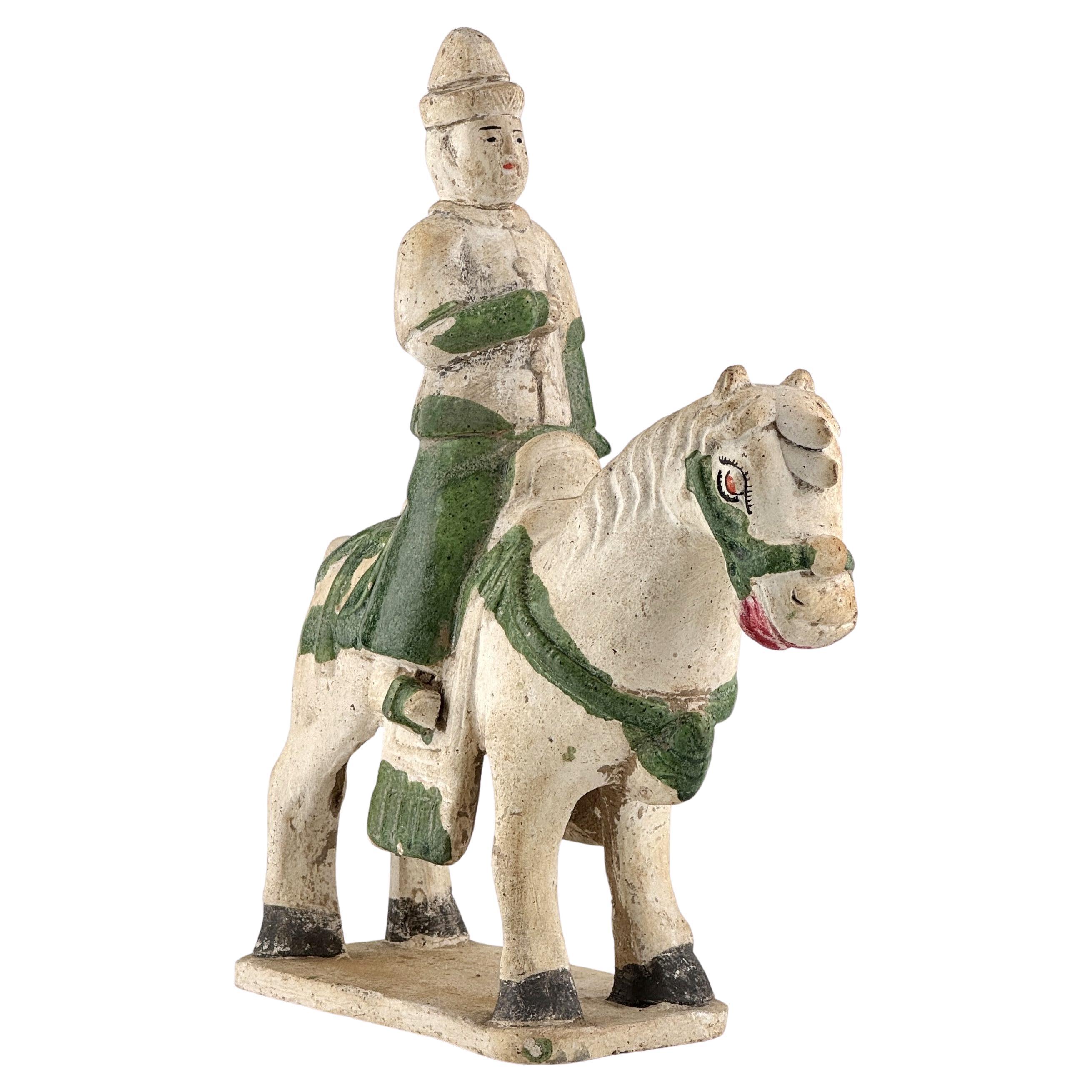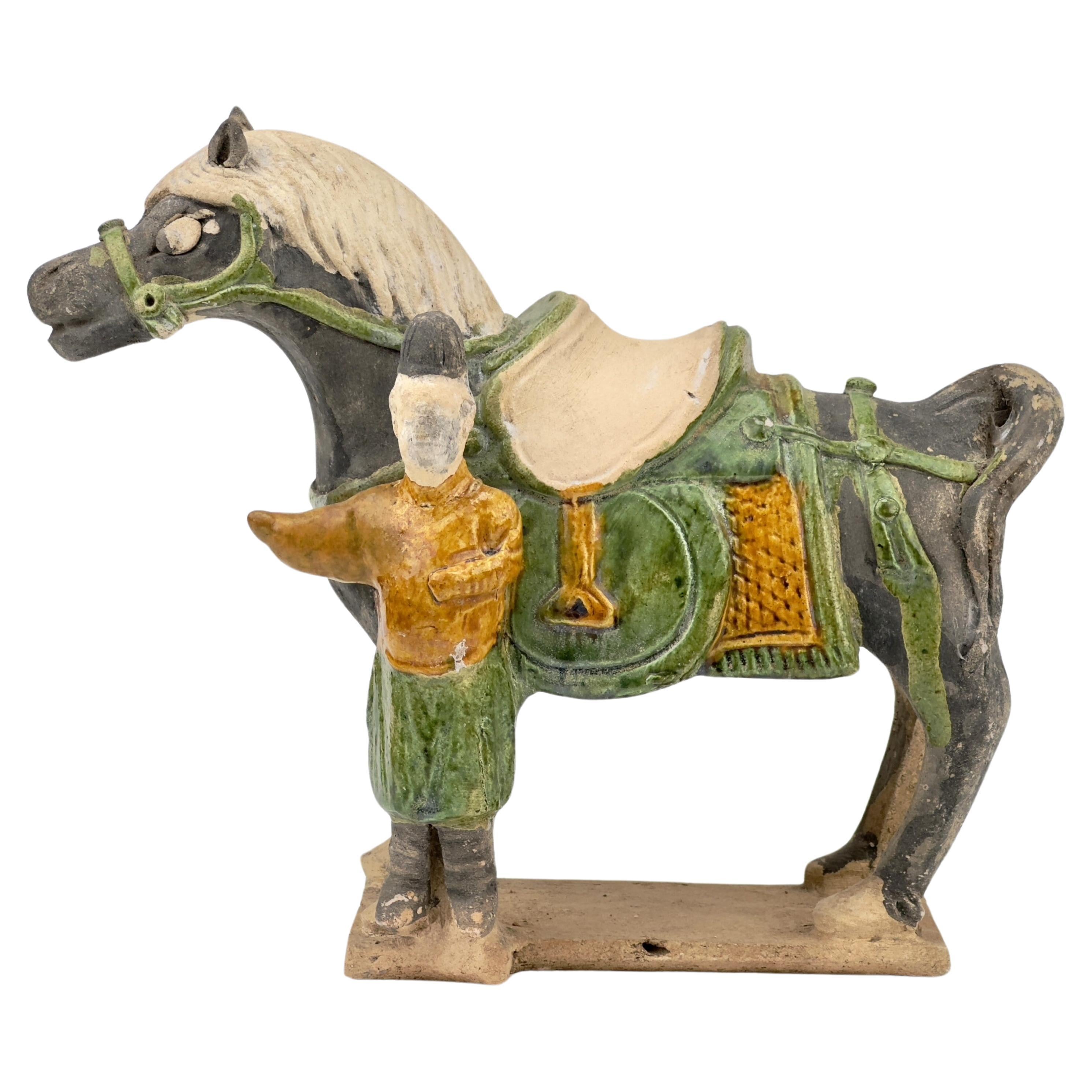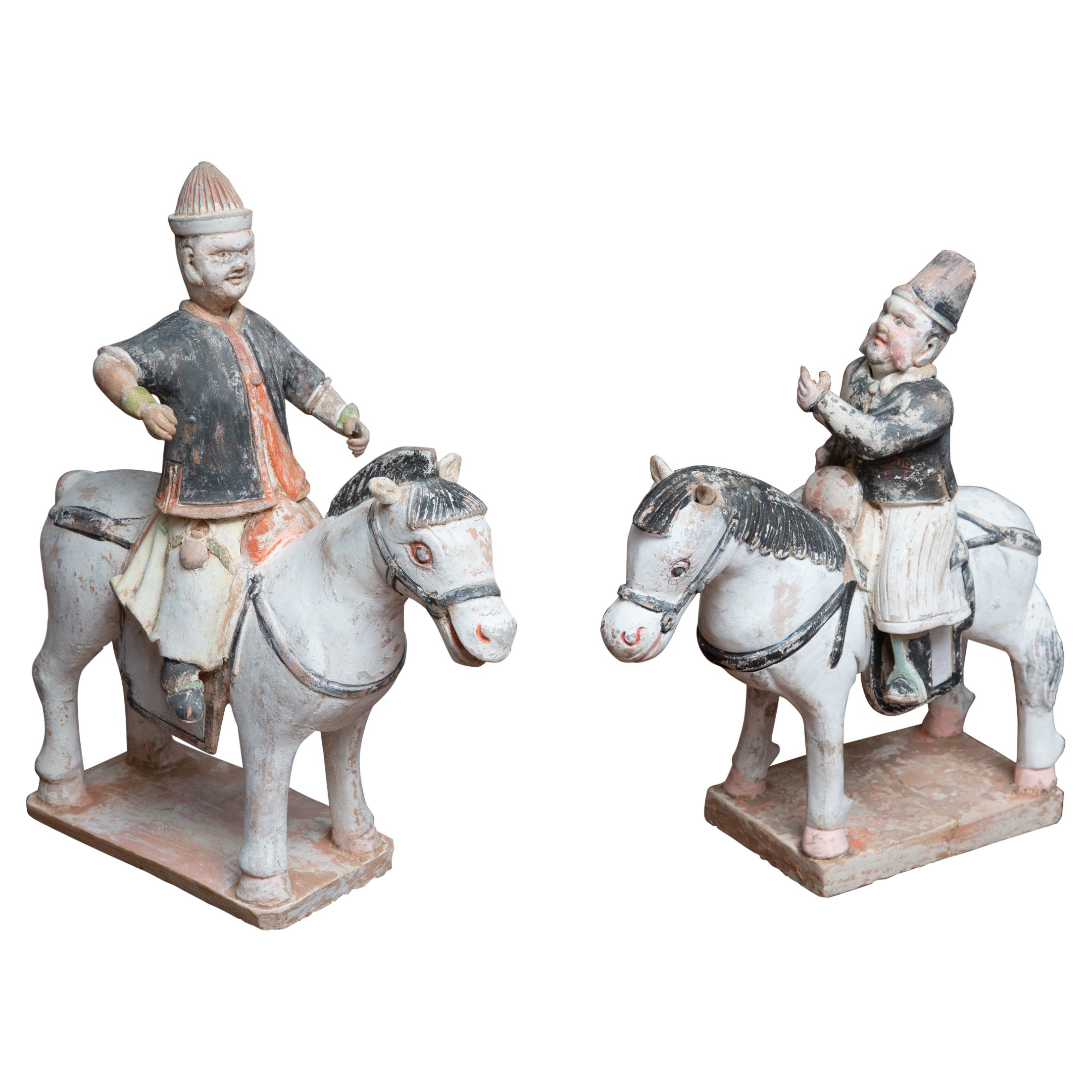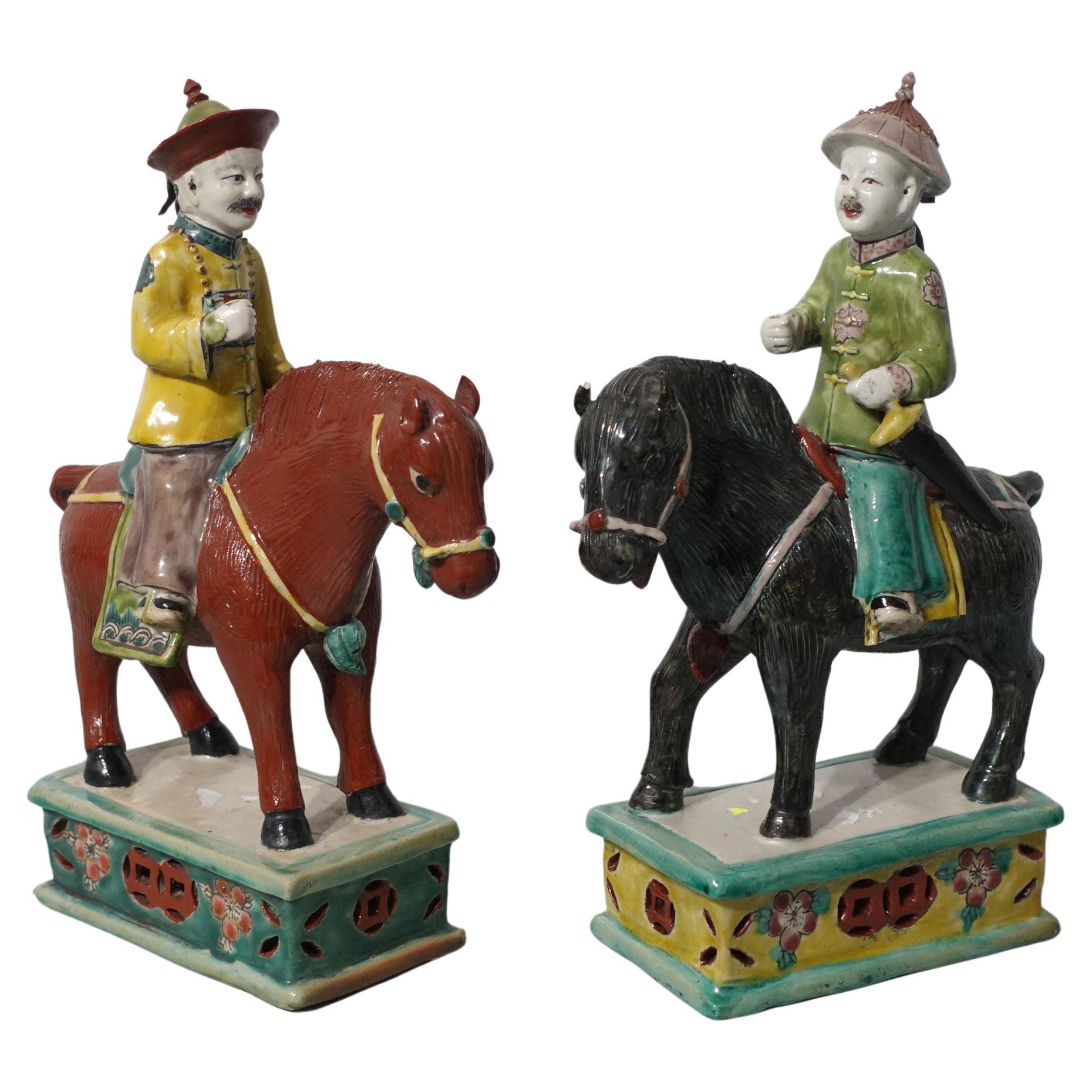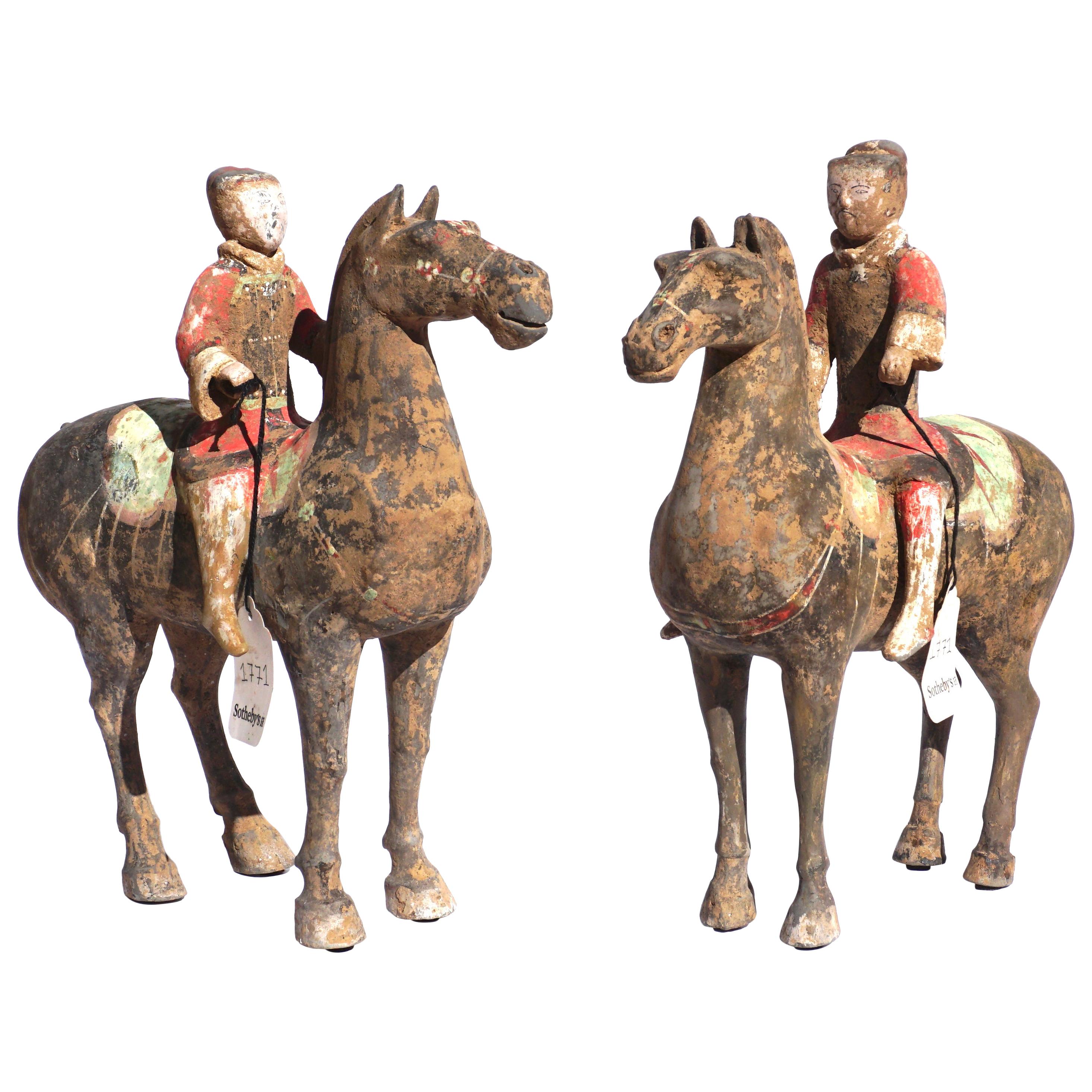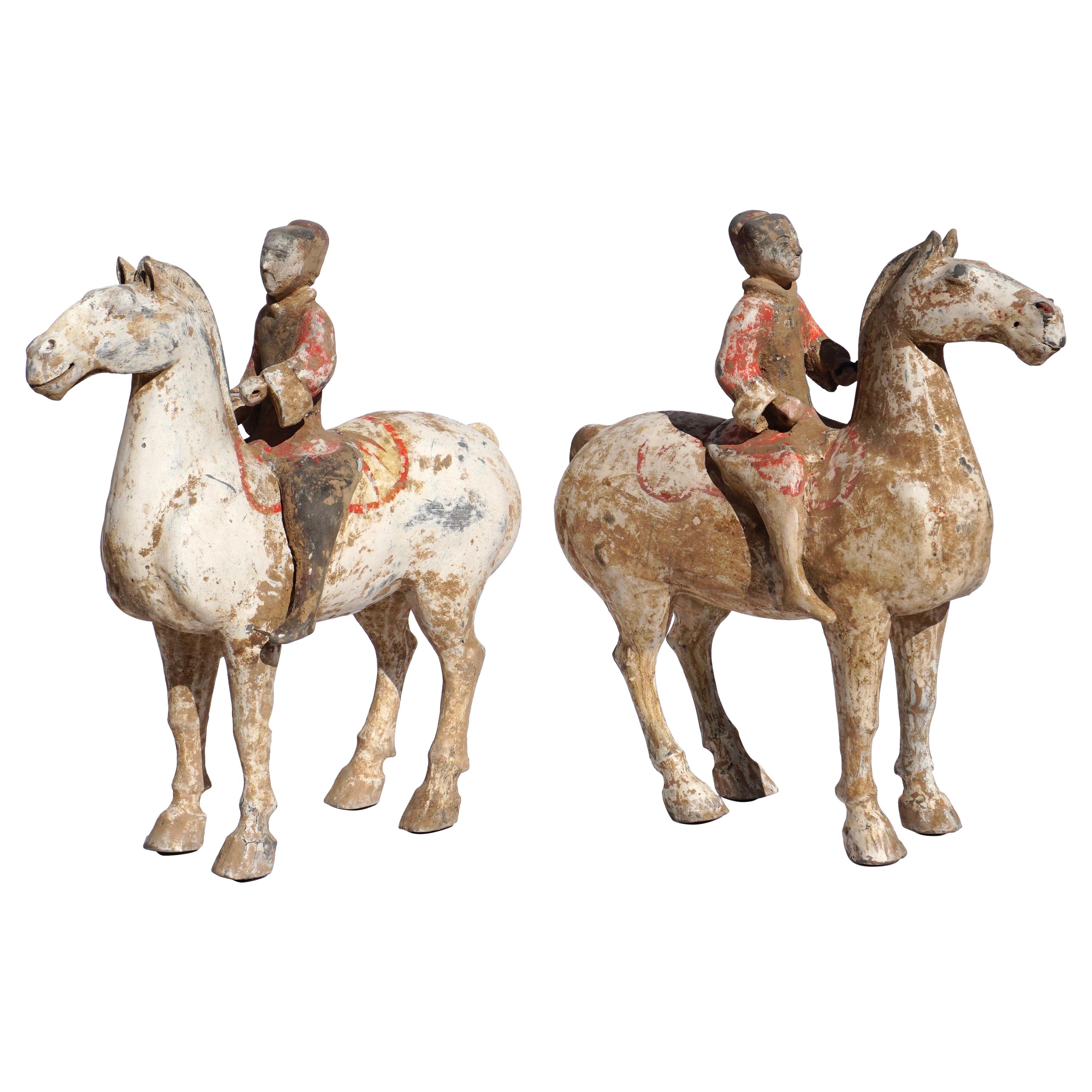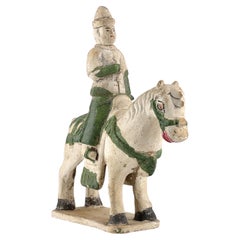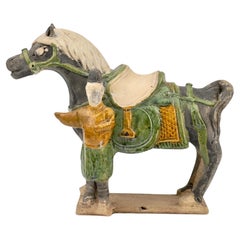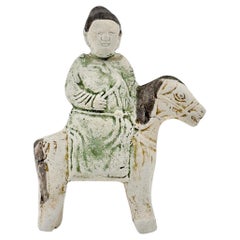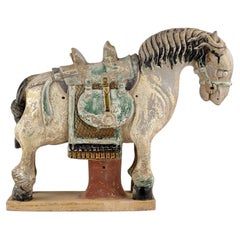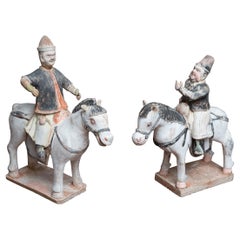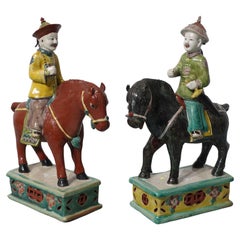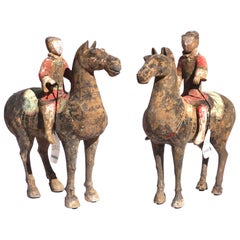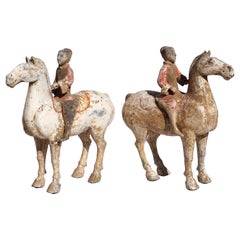Items Similar to Ming Dynasty Two Green Glazed Horses and Riders (15-16th Century)
Want more images or videos?
Request additional images or videos from the seller
1 of 14
Ming Dynasty Two Green Glazed Horses and Riders (15-16th Century)
$2,250per set
£1,720.24per set
€1,981.37per set
CA$3,152.94per set
A$3,519.96per set
CHF 1,844.41per set
MX$43,087.78per set
NOK 23,423.98per set
SEK 22,085.84per set
DKK 14,787.20per set
Shipping
Retrieving quote...The 1stDibs Promise:
Authenticity Guarantee,
Money-Back Guarantee,
24-Hour Cancellation
About the Item
Statues of Chinese horse riders, featuring glazes in green, are set on rectangular bases.
Period: Ming Dynasty
Medium: Green-glazed Pottery
Type: Figure
Provenance : Acquired in early 2000s from Hongkong
* Ming Dynasty Glazed Pottery Figures
Ming Dynasty glazed pottery figures are renowned for their bold color palette, intricate detailing, and lifelike forms, distinguishing them from earlier traditions. These figures, which depict officials, warriors, animals, and mythical creatures, are characterized by high-gloss lead-based glazes in green, amber, ochre, and sancai (three-color) combinations. The thickly applied glaze pools in recesses, creating depth and enhancing sculptural details. With dynamic postures, expressive facial features, and meticulously rendered drapery, these figures reflect the period’s advancement in ceramic craftsmanship, offering a greater sense of movement and realism compared to the rigid and stylized forms of earlier dynasties.
A defining characteristic of Ming glazed pottery is its elaborate surface detailing, often achieved through raised relief elements and contrasting glazes. Equestrian figures, for example, feature carefully sculpted saddles, harnesses, and decorative embellishments, while human figures are adorned with intricate robes and headdresses. The large scale of these tomb figures, often more imposing than those from previous periods, underscores the increasing importance of funerary art during the Ming era. Unlike later Qing Dynasty figures, which emphasize overglaze enamel decorations and famille-rose palettes, Ming glazed figures maintain a rich, saturated aesthetic, demonstrating the technical mastery of high-fired ceramics. Their sturdy construction and vibrant finishes ensure a lasting visual impact, making them some of the most remarkable works in Chinese ceramic history.
- Dimensions:Height: 11.42 in (29 cm)Diameter: 10.63 in (27 cm)
- Sold As:Set of 2
- Style:Ming (Of the Period)
- Materials and Techniques:Pottery,Glazed
- Place of Origin:
- Period:
- Date of Manufacture:15-16th Century
- Condition:Repaired: Repairs were made to the base, neck, leg, tail areas. Minor losses.
- Seller Location:seoul, KR
- Reference Number:1stDibs: LU9577239584262
About the Seller
4.8
Gold Seller
Premium sellers maintaining a 4.3+ rating and 24-hour response times
Established in 1999
1stDibs seller since 2023
38 sales on 1stDibs
Typical response time: <1 hour
- ShippingRetrieving quote...Shipping from: seoul, Korea South
- Return Policy
Authenticity Guarantee
In the unlikely event there’s an issue with an item’s authenticity, contact us within 1 year for a full refund. DetailsMoney-Back Guarantee
If your item is not as described, is damaged in transit, or does not arrive, contact us within 7 days for a full refund. Details24-Hour Cancellation
You have a 24-hour grace period in which to reconsider your purchase, with no questions asked.Vetted Professional Sellers
Our world-class sellers must adhere to strict standards for service and quality, maintaining the integrity of our listings.Price-Match Guarantee
If you find that a seller listed the same item for a lower price elsewhere, we’ll match it.Trusted Global Delivery
Our best-in-class carrier network provides specialized shipping options worldwide, including custom delivery.More From This Seller
View AllGreen Glazed Horse and Rider, Ming period(15-16th Century)
Located in seoul, KR
Statues of East Asian horse rider, featuring glazes in green, are set on rectangular base.
Period: Ming Dynasty
Medium: Green-glazed Pottery
Type: Figure
Condition : Good
Provenance : Acquired in early 2000s from Hongkong
* Ming Dynasty Glazed Pottery Figures
Ming Dynasty glazed pottery figures are renowned for their bold color palette, intricate detailing, and lifelike forms, distinguishing them from earlier traditions. These figures, which depict officials, warriors, animals, and mythical creatures, are characterized by high-gloss lead-based glazes in green, amber, ochre, and sancai (three-color) combinations. The thickly applied glaze pools in recesses, creating depth and enhancing sculptural details. With dynamic postures, expressive facial features, and meticulously rendered drapery, these figures reflect the period’s advancement in ceramic craftsmanship, offering a greater sense of movement and realism compared to the rigid and stylized forms of earlier dynasties.
A defining characteristic of Ming glazed...
Category
Antique 15th Century and Earlier Hong Kong Ming Antiquities
Materials
Pottery
$1,625 Sale Price
35% Off
Ming Dynasty Green-Glazed Horse and Rider (15-16th Century)
Located in seoul, KR
Statues of Chinese horse and rider, featuring glazes in green, amber, are set on rectangular bases.
Period: Ming Dynasty
Medium: Green-glaze...
Category
Antique 15th Century and Earlier Hong Kong Ming Antiquities
Materials
Pottery
Horse and Rider Figurine c1725, Qing Dynasty, Yongzheng Reign
Located in seoul, KR
A rider wearing an green gown. He is seated side saddle on a yellow painted horse with riding crop in hand. It was worn away on the sea floor.
Period : Qing Dynasty, Yongzheng Perio...
Category
Antique 1720s Vietnamese Chinoiserie Antiquities
Materials
Ceramic, Porcelain
$792 Sale Price
20% Off
Ming Period Large Pottery Horse with Saddle (15-16th Century)
Located in seoul, KR
The figure stands on a rectangular base. The horse is depicted in a poised stance, with strong, muscular legs and a slightly bowed head. The mane is carefully sculpted with deep, flowing grooves, adding a dynamic texture to the piece. The head features expressive details, including a well-defined muzzle, flared nostrils. The bridle and harness are delicately painted in faded green, contrasting against the creamy beige body. The saddle is adorned with intricate details, including decorative tassels and a textured pattern, indicative of the elaborate tack used in the Ming period.
Traces of original polychrome pigments in green, black, and ochre remain on the surface, hinting at the sculpture’s once-vibrant appearance. The weathered patina and areas of flaking paint add to its historical authenticity, reflecting centuries of age. The overall craftsmanship and detailing exemplify the Ming Dynasty’s refined ceramic artistry, making this piece a remarkable representation of of asian culture during this period.
Period: Ming Dynasty
Medium: Green, black, and ochre glazed Pottery
Type: Figure
Condition : Good(chips on the upper saddle.)
Provenance : Acquired in late 1990s from Hongkong
Reference : Asian Civilisations Museum - Accession No. C-1384 / 1994-00441 - Ming Dynasty Figure of Horse
(Type : Closely Related)
* Ming Dynasty Glazed Pottery Figures
Ming Dynasty glazed pottery figures are renowned for their bold color palette, intricate detailing, and lifelike forms, distinguishing them from earlier traditions. These figures, which depict officials, warriors, animals, and mythical creatures, are characterized by high-gloss lead-based glazes in green, amber, ochre, and sancai (three-color) combinations. The thickly applied glaze pools in recesses, creating depth and enhancing sculptural details. With dynamic postures, expressive facial features, and meticulously rendered drapery, these figures reflect the period’s advancement in ceramic craftsmanship, offering a greater sense of movement and realism compared to the rigid and stylized forms of earlier dynasties.
A defining characteristic of Ming glazed pottery is its elaborate surface detailing, often achieved through raised relief elements and contrasting glazes. Equestrian figures, for example, feature carefully sculpted saddles, harnesses, and decorative embellishments, while human figures are adorned with intricate robes and headdresses. The large scale of these tomb figures, often more imposing than those from previous periods, underscores the increasing importance of funerary art during the Ming era. Unlike later Qing Dynasty figures...
Category
Antique 15th Century and Earlier Hong Kong Ming Antiquities
Materials
Pottery
$2,800 Sale Price
30% Off
Rare Yue Celadon-Glazed Two Haitai Statues, Western Jin dynasty (265-420)
Located in seoul, KR
The statue seems to be a mythical beast standing in a poised and alert stance, with its mouth open as if roaring or breathing fire. Its body is covered in detailed carvings that resemble scales and feathers, indicative of the high level of craftsmanship during the Jin Dynasty. The creature’s presence is both regal and intimidating, suggesting it might have been believed to possess protective properties.
Period : Western Jin Dynasty (266 - 316 AD)
Type : Haitai Statue
Medium : Yue celadon...
Category
Antique 15th Century and Earlier Hong Kong Chinese Export Antiquities
Materials
Celadon
$8,970 Sale Price / set
70% Off
Four Green Glazed Pottery Attendant Figures, Ming Dynasty(1368-1644)
Located in seoul, KR
The first figure wears a short cap and takes a posture as if carrying something on the shoulder, possibly symbolizing a servant or a messenger.
The second figure wears a tall hat and...
Category
Antique 15th Century and Earlier Hong Kong Ming Antiquities
Materials
Pottery
$1,950 Sale Price
35% Off
You May Also Like
17th Century Pair of Painted Terra Cotta Chinese Gentlemen on Horses
Located in WEST PALM BEACH, FL
This is a unique pair of painted Chinese terra cotta gentlemen in native costumes on horseback, purported to be Ming.
Category
Antique 17th Century Chinese Ming Antiquities
Materials
Clay
Antique Pair of Chinese Su Sanci Glazed Horse Figure and Men, 19th Century
Located in Norton, MA
Antique Pair of Chinese Su Sanci Glazed Horse Figure and Men, from 19th Century.
One with a small missing piece, please see the last photo, the black horse on the back blanket below...
Category
Antique 19th Century Chinese Other Figurative Sculptures
Materials
Porcelain
Pair of Han Dynasty Pottery Horses and Equestrian Riders
Located in Dallas, TX
A wonderful pair of Ex Sotheby’s painted Polychrome Equestrian Horse and Riders made from gray pottery, Presents beautifully and guaranteed authentic with provenance and COA.
Measures: Height 11.5 inches and width 11 inches
Condition: Possible professional restorations but not detectable.
Provenance: Sotheby’s London. 16th November, 1999. Lot 12 (2 of 4 horses in that lot).
Sotheby’s New York, NY September 14, 2019.
The importance of the horse in the history and culture of China can be viewed, in part, through the artistic legacy of this great civilization. In sculpture, painting, and literature, horses were glorified and revered. Horses were believed to be related to mythological dragons, reflecting their sacred status within society. During the unification of China under the Han Dynasty, bands of mounted nomadic warriors from the north threatened the country. In order to thwart their attacks, the Chinese sought to import stronger, faster steeds from Central Asia (as opposed to the Mongol ponies used by the invaders), eventually leading to the creation of the Silk Road. This small sculpture of a mounted soldier reveals the crucial military role of the horse. When compared to the diminutive stature of the rider, the importance of the horse becomes readily apparent. This creature provided security and strength, allowing the Empire to secure its borders and expand its influences across Central Asia. The magnificent regalia of the horse, including a brilliantly painted saddle in red and green/gold, reflect the respect this animal received. The warrior as well is gorgeously decorated with a painted red tunic and gray chest...
Category
Antique 15th Century and Earlier Chinese Chinoiserie Animal Sculptures
Materials
Pottery
Pair of Han Dynasty pottery Horses and Equestrian Riders
Located in Dallas, TX
A wonderful pair of Ex Sotheby’s painted Polychrome equestrian horse and riders made from gray pottery, presents beautifully and guaranteed authentic with provenance and COA.
Measures: Height 11.5 inches and width 11 inches
Condition: Possible professional restorations but not detectable.
Provenance: Sotheby’s London. 16th November, 1999. Lot 12 (2 of 4 horsed in that lot)
Sotheby’s New York, NY September 14, 2019.
AVANTIQUES is dedicated to providing an exclusive curated collection of Fine Arts, Paintings, Bronzes, Asian treasures, Art Glass and Antiques. Our inventory represents time-tested investment quality items with everlasting decorative beauty. We look forward to your business and appreciate any reasonable offers. All of our curated items are vetted and guaranteed authentic and as described. Avantiques only deals in original antiques and never reproductions. We stand behind our treasures with a full money back return if the items are not as described.
The importance of the horse in the history and culture of China can be viewed, in part, through the artistic legacy of this great civilization. In sculpture, painting, and literature, horses were glorified and revered. Horses were believed to be related to mythological dragons, reflecting their sacred status within society. During the unification of China under the Han Dynasty, bands of mounted nomadic warriors from the north threatened the country. In order to thwart their attacks, the Chinese sought to import stronger, faster steeds from Central Asia (as opposed to the Mongol ponies used by the invaders), eventually leading to the creation of the Silk Road. This small sculpture of a mounted soldier reveals the crucial military role of the horse. When compared to the diminutive stature of the rider, the importance of the horse becomes readily apparent. This creature provided security and strength, allowing the empire to secure its borders and expand its influences across Central Asia. The magnificent regalia of the horse, including a brilliantly painted saddle in red and green/gold, reflect the respect this animal received. The warrior as well is gorgeously decorated with a painted red tunic and gray chest...
Category
Antique 15th Century and Earlier Chinese Han Animal Sculptures
Materials
Pottery
Chinese Tang Dynasty Sancai Glazed Horse and Rider, TL Tested, China
Located in Austin, TX
A fine and unusual Chinese Tang Sancai glazed model of a horse and rider, Tang Dynasty (618 to 906 CE), early 8th century, China.
This fantastic sculpture portrays a male figures se...
Category
Antique 15th Century and Earlier Chinese Tang Antiquities
Materials
Earthenware, Pottery
Pair of Ming Dynasty Horsemen Roof Tiles
Located in London, GB
A pair of Chinese Ming Dynasty (1368-1644) sancai-glazed ridge tiles modelled as horse and rider. Both tiles are glazed in rich green and amber, the horses ...
Category
Antique 16th Century Chinese Ming Ceramics
Materials
Pottery
